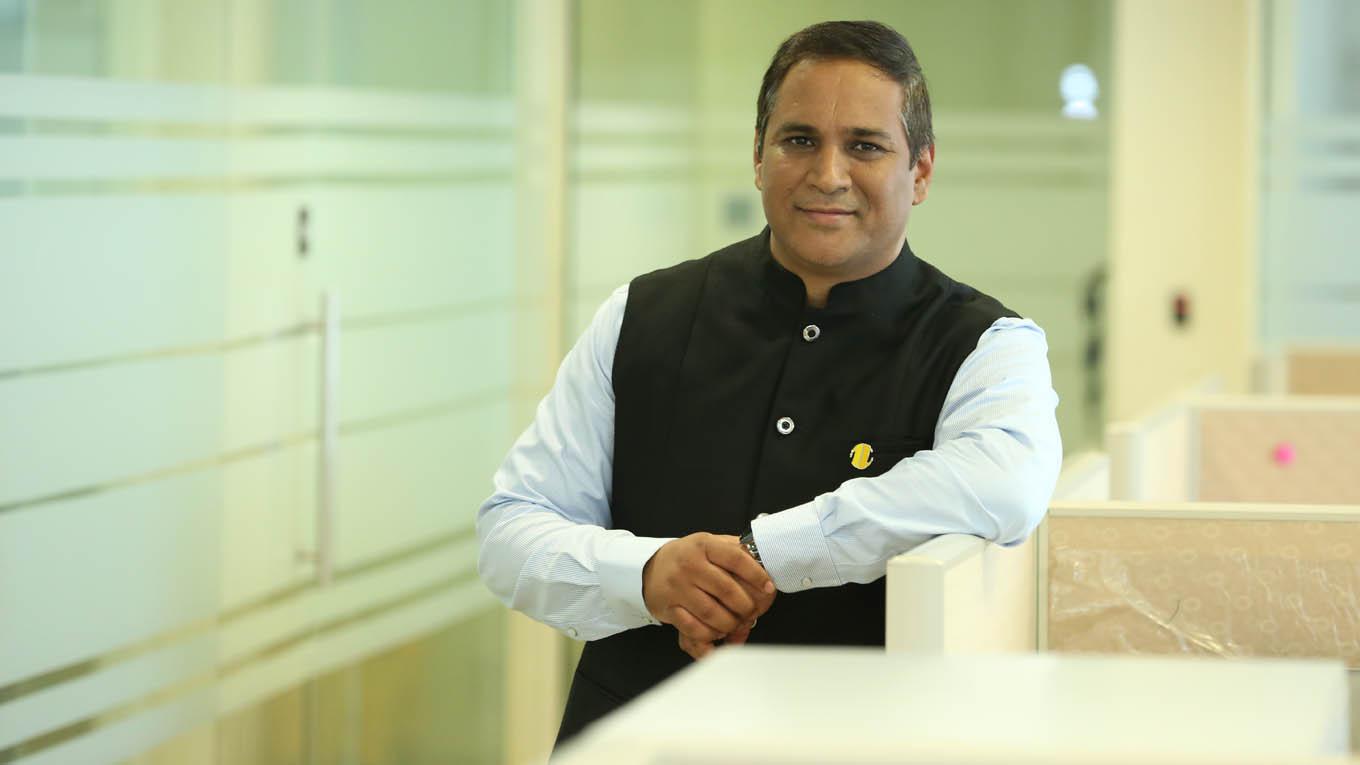-
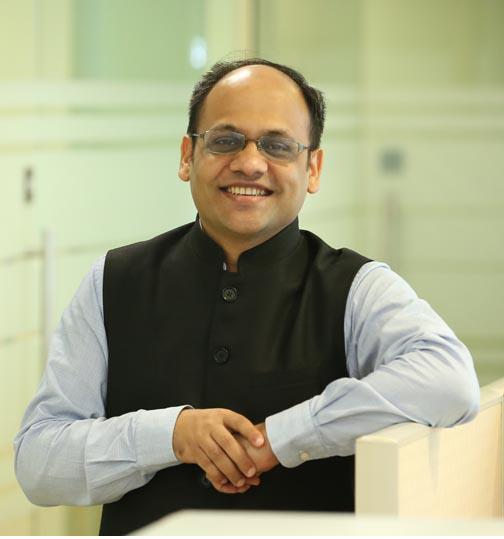
Agarwal: playing a key role
In fact, the Aavishkaar group has turned into a complete development platform which has a whole gamut of solutions for the impact investing landscape which is now gradually taking shape in India and is all set to commence its next growth phase where the group is looking to take its assets under management (AUM) to around $5 billion by 2025 and $12 billion by 2030.
In the process, Aavishkaar aims to help create over 10 million jobs and livelihoods in the next five years.
While in the initial years, the group struggled to raise funds and scale up its operations, the last decade or so have been quite encouraging as its AUM has risen sharply from around $25 million in 2010. With the impact sector gradually taking some shape, global investors have also shown a keen interest to be part of this success story. In the last few years, four global investors, Triodos Investment Management & Shell Foundation, Nuveen (TIAA) and FMO Bank have picked up 49 per cent in Aavishkaar’s holding platform, investing around $100 million.
Triodos Investment Management, the investment arm of European lender Triodos Bank, has also backed the group’s SME lending entity Ashv Finance, in which impact investment firm Omidyar Network, US-based fund manager Developing World Markets, community development financial institution Calvert Foundation, Overseas Private Investment Corporation (the US government’s development finance institution) and the Michael & Susan Dell Foundation (a philanthropic organisation started by the founder of technology company Dell) are also investors.
The group has played a large role in creating a landscape of social entrepreneurships and has built a strong organisational structure led by a core team comprising the best brains from across industries. The Aavishkaar group has become a case study in many business institutions, including Stanford Business School and IIM-Ahmedabad.
Creating livelihoods
With its vision to bridge the opportunity gap for the three-billion underserved population globally, the group is driven by its mission to create livelihoods and jobs as also empower underserved households and small businesses in a sustainable manner.
Aavishkaar’s investee companies include, among others, Equitas, Suryoday Small Finance Bank, Utkarsh Bank and CreditAccess Grameen Ltd in the financial services space; INI Farms (now India’s largest exporters of pomegranates and bananas), AgroStar (one of the largest agri-tech companies), and Ergos (agri warehouses in rural India and working in Bihar) in the agri space; Ahmedabad-based NEPRA in waste management; fintech entity Chqbook, and GoBolt, an express supply chain company. Importantly, in most of these highly successful cases, Aavishkaar has been the early investor, actively helping them chart out their growth journeys.
-
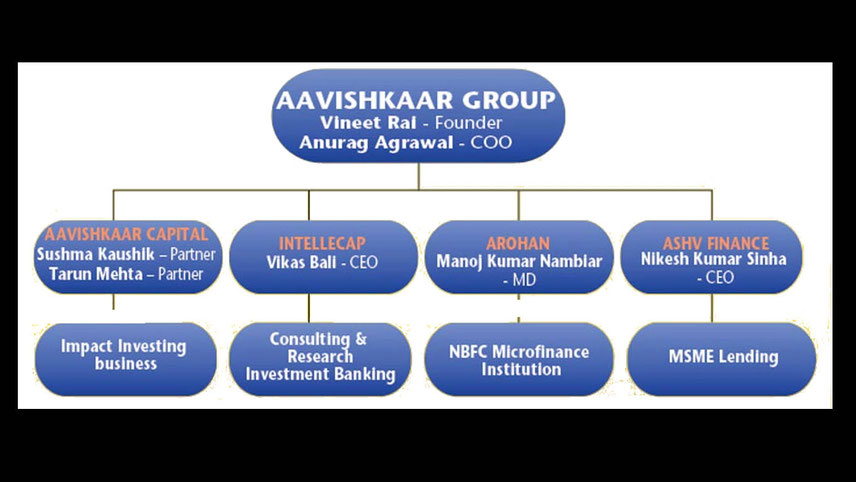
“The Aavishkaar group is a pioneer in the impact investment space in India. They did something that very few could have thought of doing at the time. In fact, Vineet has played a commendable role in building up this entire ecosystem in the country. He has a very dynamic personality and doesn’t hesitate to take risks. He can sense opportunities and he is one of the first to get there. Despite all sorts of challenges and headwinds, he has relentlessly worked towards creating this platform which today has become synonymous with the impact ecosystem,” says Vijay Mahajan, CEO, Rajiv Gandhi Foundation and the director of the Rajiv Gandhi Institute for Contemporary Studies.
It was Mahajan whom Vineet Rai, the founder and chairman of the Aavishkaar group, approached with the idea of starting Aavishkaar as a micro venture fund, to kick-start the whole thing. Mahajan, who was then running the Basix Social Enterprise Group, was aligned with Rai on the idea of establishing a social enterprise which could serve needs which neither the market nor the government were able to. After Aavishkaar was formed in 2001, Mahajan was a member of its investment committee for nearly three years.
“Aavishkaar has emerged as a complete platform through lots of learning over the years. It has proved that real impact can also be achieved without compromising on the commercial aspect and that too, in a sustainable manner. The group’s ability to identify needs and develop products and solutions as per local needs is commendable. Vineet knows how to attract talent and provide the alignment that helps them work more as entrepreneurs,” says Akbar Khan, CEO of CreditEnable India, a 2017-founded entity which operates an entirely digital and curated marketplace for SME finance.
Khan was the CEO and board member of the group’s SME lending business, intelleGrow (now Ashv Finance) for two years, between 2016-18. Prior to his role at Aavishkaar, Khan spent five years at General Electric, where he was managing director and head of corporate development/M&A for GE South Asia and MENAT.
“Aavishkaar was started with the objective of providing capital to ideas that can create jobs and livelihoods in rural India. I wanted to create an ecosystem of social entrepreneurs who could carry out my vision. The idea was to use the power of human thinking which was talent and capital, to harness the entrepreneurial wheel of Indians to solve India’s problems. The big picture was that I wanted entrepreneurs to work for India and not just for money,” says Rai, 49, who while setting up his first fund also quickly went on to put up Intellecap (short form of intellectual capital) in 2002, the very next year after the formation of his equity financing business, Aavishkaar Capital. The idea was to bring capital and talent on the same platform to create a vibrant ecosystem of social entrepreneurships that could eventually create jobs and livelihoods in rural India.
From Gian to Aavishkaar
The thought process leading to this occurred to him when he was heading Grassroots Innovations Augmentation Network (Gian), an Ahmedabad-based incubator set up by the Gujarat government to help farmers convert their ideas into sustainable businesses.
His journey to being appointed the CEO of Gian in 1998 was quite an interesting one. He was from UP, but grew up in Rajasthan, moving from city to town, wherever his father’s work as a hydro-geologist for the government took him. Inspired by Maharana Pratap and Chandrashekhar Azad, he grew up watching soldiers patrolling the borders of Rajasthan, and his only ambition then was to join the Armed Forces. He passed his written exams but failed the interviews every time. That was when a friend suggested that he should try for the Indian Institute of Forest Management in Bhopal.
-
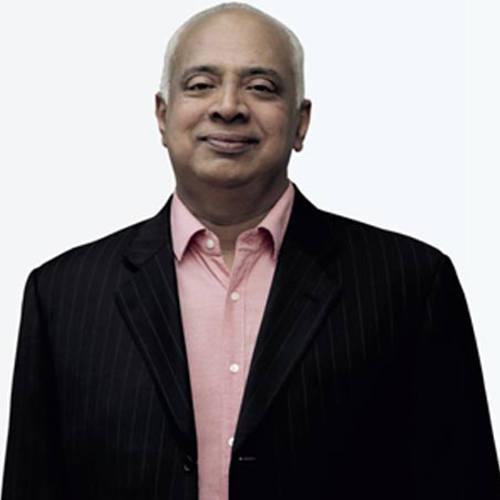
After graduating from IIFM, he joined Ballarpur Industries and was posted in the forested lands of Odisha, from where the paper-maker sourced its raw material. He spent a little over three years on the job, fending off wild animals while managing the forests. It was while working in Odisha that he saw extreme poverty at close range. The levels of deprivation, infant deaths and malnutrition were appalling.
While being posted in Odisha, he married Swati, who had been a year junior to him at IIFM. But when the Rais were expecting their first child, his wife (who is also co-founder and actively sits on the board meetings) insisted he found a safer job away from the forest. “In fact, she gave me an ultimatum to move to a more civilised place, as our immediate neighbours were more than a kilometre away,” he says.
He applied for various positions, but found that nobody wanted someone with his background. That’s when he found out that Professor Anil Gupta of IIM, Ahmedabad, was looking for a research assistant for a project on biodiversity. Rai moved to Ahmedabad, took up the job, but realised after a year that this was not what he was looking for.
He applied to Gian, expecting the post of a manager and instead they made him the CEO. Here, he explored how innovations carried out by farmers on a small scale could be converted to good business. He realised that nurturing an innovation into a full-fledged business requires an entrepreneur, not an innovator, in the lead and since that entrepreneur was taking a risk, he required risk capital. The biggest challenge was not in finding the entrepreneur or the innovation but in providing the risk capital but that, coupled with high quality talent, could build businesses that would, as he put it, make poor people rich.
“Moreover, it also became clear that change cannot happen if capital and talent together are not taken to rural India. And that’s how the idea of Aavishkaar as the first venture fund for rural India and Intellecap as a repository for talent was born,” reminisces the Aavishkaar chief.
He quit the job and put up a venture fund to serve rural India. Being a forester, his problem was that he did not know how to raise money. Finally, through the connections he had developed while at IIM-A and Gian, he presented his ideas to a handful of expat Indians living in Singapore and managed to raise SG$100,000. Most of these people were from IIM-A.
These included Anant Nagesan, currently a part time member of the Prime Minister’s Economic Council, Arun Diaz, a veteran entrepreneur and investor who would later become a key advisor and partner in Rai’s newly formed venture capital fund, and Jayesh Parekh, who is famous for bringing Sony TV to India.
Providing non-financial support
In October 2001, the fund was formally named Aavishkaar (Hindi for ‘invention’) and in March 2002, as per his vision of bringing capital and talent together, Rai set up Intellecap, borrowing Rs1,00,000 from his wife. The idea was to provide non-financial support, including research and consultancy services, to rural enterprises and help them scale up.
While he formed the fund with the little money he raised in Singapore, he struggled to raise further money. In fact, it took him almost five years to raise the first Rs5 crore. His not being a finance guy was an impediment as it was difficult to convince investors; so was the idea (radical at the time) of using the venture capital method to serve the rural, low-income market.
-
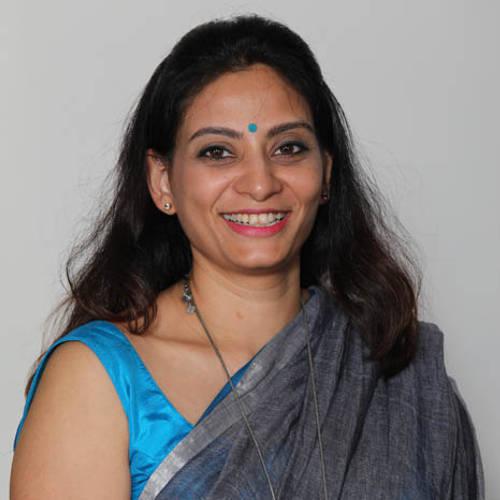
Like Aavishkaar Capital, Intellecap, too, struggled initially. By 2005, Aavishkaar had managed to raise only Rs5 crore and Intellecap’s turnover was around Rs50 lakh. That’s when Rai thought of bringing in some changes. By 2005, the microfinance market had started getting some traction and Aavishkaar also decided to invest in the microfinance space as well. Moreover, Intellecap also rode the wave, advising and eventually incubating institutions like Utkarsh, Suryoday Small Finance Bank, Grameen Koota Financial Services and a few others. Today, Intellecap advises not just microfinance institutions but a whole lot of businesses from various sectors.
Between 2005 and 2007, Aavishkaar Capital expanded to Rs70 crore of fundraising and Intellecap had grown from Rs50 lakh to Rs6 crore. “Besides, we were slowly and gradually explaining to people that we were trying to make a developmental impact while making money for them. In other words, we were able to showcase that one could do business to create an impact and that was getting noticed not just in India but globally,” says Rai.
By now Aavishkaar had money but was not able to find ways to scale its business. Between 2007 and 2010, Rai and his team struggled to deal with the idea of building a scalable business model. He realised that he had to make companies that would make a difference in the lives of people and then make money, which was different from philanthropy or just doing business. Moreover, this approach, he felt, would also help him attract reputed professionals, something he felt was paramount to achieve the desired scale.
During 2009 and 2010, both Aavishkaar and Intellecap ramped up their talent pool, roping in reputed bankers, consultants and other senior industry people from across industries and geographies.
This new team (which included, among others, Manoj Nambiar, the head of the group’s microfinance business and Sushma Kaushik, one of the partners of the group’s flagship equity financing business) with good industry experience, started changing the group’s positioning in the market from a young and ambitious entity to a potentially emerging entrepreneurial one that was trying to make an impact and also create value.
Nambiar, who is currently the managing director and CEO of Arohan Finance, is one of the most respected and known leaders in the microfinance business. Before joining the group, he was based in the Middle East and was looking to return to Mumbai where his parents were based. He wanted to work for an organisation which respected who he was, and with people who could work with him and bring in new ideas. He found Rai’s offer of mutual trust interesting, although he joined at a significantly lower salary than what he was drawing in his earlier organisation. It was the same with all the other people.
“All these people were talented, with good experience and could have worked in big organisations with hefty salaries. Instead, they joined us because of a common goal to create a real impact in the lives of people in a very sustainable manner,” states Rai.
By 2010, the total AUM of the group grew to $27 million with 80 employees, but it still lacked the desired scale. By then the group had incubated a large number of microfinance institutions and invested in around 25-odd companies like Utkarsh, Suryoday, and others. However, in 2010, the microfinance crisis hit both Aavishkaar and Intellecap. One of the learnings for the group from the crisis was to have its own microfinance institution and expand its lending beyond Aavishkaar Capital.
The biggest risk
In 2012, even though the microfinance sector was still recovering from the crisis, the Aavishkaar group took one of its biggest risks and bought over the Kolkata-based microfinance company, Arohan Financial Services for Rs12 crore. Even though Arohan was struggling, the group saw a good opportunity in the form of Arohan delivering on its vision of building a microfinance institution in low income states like Bihar, UP, Jharkhand and Odisha. Nambiar, who joined Rai in Mumbai, currently manages Arohan and is based in Kolkata. He is also the chairman of the microfinance industry body, Microfinance Institutions Network or MFIN, and is on the boards of many other industry institutions.
Around the same time, the group also started another entity called IntelleGrow, to experiment and provide venture debt to early stage social or impact enterprises with an investment of Rs2 crore and some financial assistance from the Shell Foundation. Besides, it also set up another NBFC MFI called Intellecash which is now part of Arohan. That was how the second phase of the journey started after 2010 as the group was looking to scale up its business.
-
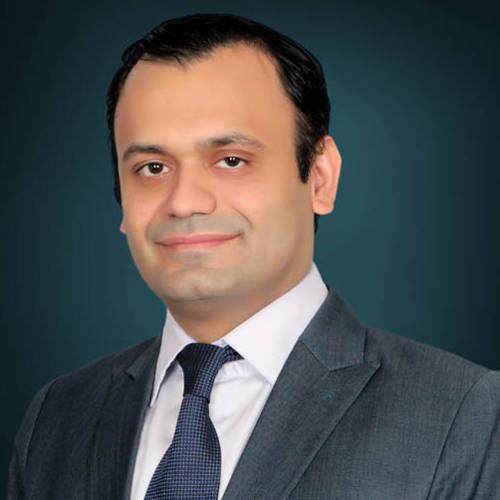
Mehta: gearing up to expand
By now, the group had a total AUM of $120 million. It continued to grow slowly until 2015 when Aavishkaar decided to set up a new fund in South East Asia, and became the only Indian fund manager with an international fund. By 2015, the group expanded its total AUM to around $200 million, but the scale and momentum were still missing. But by now more and more people had heard of the group and started joining them. Among the key people who joined the group were E.N. Venkat, partner from Lazard who worked at setting up the group’s international fund in South East Asia. It was Venkat who realised something was missing, which resulted in a lack of the required momentum and scale of the group.
While Rai was connected to all the four businesses of the group, none of the businesses were talking to each other and were operating in isolation. In other words, though the group was small, the structure was quite complex. Rai realised this and asked the core team to work on a process that could bring all the entities onto a single platform so that the group, as a holding company, could directly hold all the key assets. It also needed $25 million in order to execute this new structure. In 2017, the group raised this money from both Shell and Triodos.
Triodos Investment Management, the investment arm of European lender Triodos Bank, invested $15 million on the holding company level, while Shell Foundation, an independent charity established by the Shell Group, contributed $10 million to this equity-led funding.
This was followed by two more rounds of investments at the holding company level by global investors. In 2018, Nuveen, the investment management arm of diversified financial services giant Teachers Insurance and Annuity Association (TIAA), invested about $32 million to pick up 20 per cent stake in the group. Nuveen had earlier invested in the group, but as limited partners in its funds. “The Aavishkaar group is an excellent fit within our impact investing approach, which, among other goals, focuses on ways to make basic services available for low-income and underserved people around the world while also providing return opportunities for our clients,” said Vijay Advani, CEO of Nuveen, on the investment. As a part of transaction, Advani joined Aavishkaar’s board. Nuveen, which was acquired by TIAA in 2014, manages assets of over $950 billion and is spread across 16 countries.
In the third phase of its consolidation, which started in 2010, the group, in September last year, raised $37 million from the Dutch Entrepreneurial Development Bank, FMO, which also had participated earlier as a limited partner in Aavishkaar Capital. “We will work with the Aavishkaar group to strengthen its institutional foundation so that they can focus on what they do well. Vineet Rai and his team have a terrific record of finding innovative solutions to help solve many of the key social and environmental issues of our day. We look forward to growing our relationship with these world-class social entrepreneurs,” says Peter van Mierlo, CEO, FMO.
With all these investments in place, the group, which also utilises part of the money to strengthen its ownership in its subsidiaries, plans to pursue its vision and expand its business to other parts of Africa and South East Asia. Aiming to take its total AUM up to $ 5 billion by 2025 and $12 billion by 2030, it is also looking to ramp up its capabilities in a significant way.
-
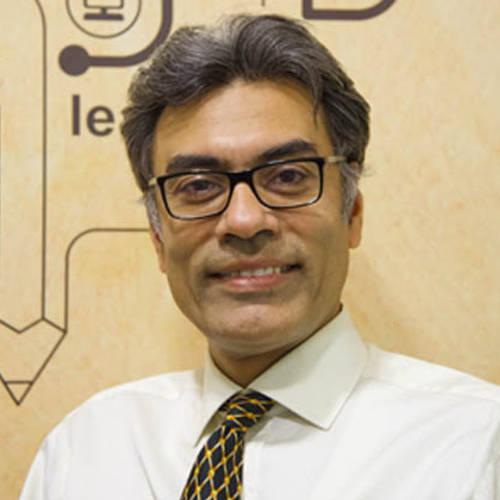
Bali: taking care of nature
“We now have all the requisite structure and competencies to achieve our goals in the expanding impact ecosystem. While India will be our primary market, we want to replicate our success story in other locations in Africa and South East Asia. In fact, we have already forayed into some of these countries and are now looking to ramp up our overall overseas efforts,” says Anurag Agrawal, COO, Aavishkaar Group, who along with Rai, chairman, Aavishkaar Group; Swati Rai, director, Aavishkaar Group; Kaushik and Tarun Mehta, partners, Aavishkaar Capital; Nambiar of Arohan, Nikesh Kumar Sinha, CEO, Ashv Finance and Vikas Bali, CEO, Intellecap, are the promoters (holding 51 per cent stake in the holding company) and together form the strong leadership team which is going to drive the scale, going forward.
Setting a goal
The group has already put up a roadmap to achieve the set goal of $12 billion AUM by 2030. In phase I, which aims to achieve $5 billion by 2025, the group needs to create five times more jobs and livelihoods than today.
“The group aims to have at least 20 million direct microfinance customers through Arohan, lend to thousands of micro, small and medium enterprises through the new entity Ashv, and Aavishkaar should be able to raise a significant amount of capital to support hundreds of enterprises in India, Africa and Southeast Asia in order to create local jobs and livelihoods,” says Rai, adding that out of this $5 billion, microfinance company business Arohan should contribute $2.5 billion, Ashv Finance: $1 billion and Aavishkaar Capital the remaining amount of around $1.5 billion. Intellecap will be able to create bridges between all the ecosystems and will operate in India, Africa and South East Asia with 80 per cent business in India and the reaming 20 per cent in the other two global markets.
In the next five years, from 2025 to 2030, says Agrawal, we will have to grow the business two times at least. To do that the group need to replicate the strategies of Arohan and Ashv Finance in Africa and also scale the assets under management on the impact side to around $2.5 billion, taking it to the goal of $12 billion by 2030. This is going to be based on another entity creation between Arohan, Ashv Finance and Aavishkaar Capital.
“We are all ready to work towards achieving the set goals as the entire impact investing ecosystem is undergoing a big change. For a very long time, people used to consider impact investing as not for profit investing or philanthropic investing or grant based investing. However, Aavishkaar’s philosophy has always been to invest in businesses which have profitable business models and the ability to scale and create 10x kind of impact,” says Kaushik who has been a part of this transition journey since 2010.
“We are now all geared up to expand our impact ecosystem. While our focus will remain on India, we will now increase our impact investment in South East Asia and Africa. We will try to replicate our Indian success stories in these markets and help create a strong ecosystem over there,” states Mehta.
Aavishkaar Capital, the impact investing arm of the Aavishkaar Group, is a global pioneer in taking an entrepreneurship-based approach to scaling businesses for impact. It invests in sectors such as agritech and food processing, inclusive finance and essential services across India, emerging Asia, and Sub-Saharan Africa. Aligned to 13 out of the 17 Sustainable Development Goals, Aavishkaar Capital has so far raised six funds with a total AUM of around $400 million.
-
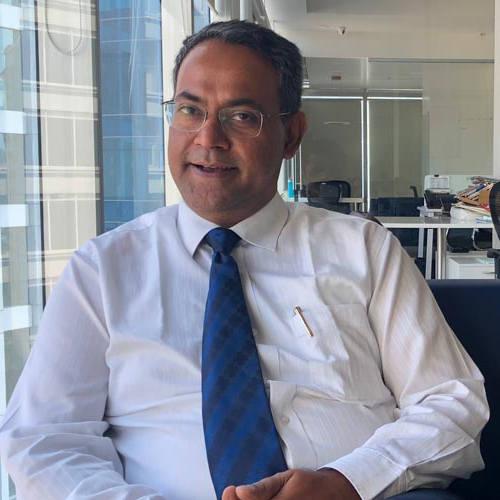
Sinha: uniquely designed products
Out of 70 investments across companies, it has given full or partial exit in 32 cases. Aavishkaar Capital will return to the market sometime soon to raise $300 million for its next fund. Rai is of the view that Covid-19 is going to be one of the biggest disruptors and this once again validates the need for creating a strong and robust impact ecosystem in the world and thereby help needy people. “The current Covid-19 crisis is the biggest disruption mankind has ever seen. It remains to be seen how we, as an impact player, keep the world healthy, safe and sustainable while generating growth and return for our capital,” he adds.
Established in 2006 in Kolkata, Arohan Financial Services is Eastern India’s largest NBFC microfinance institution. As on March 2020, the organisation is operational in 16 states (of which 11 are low-income states across the central, east and northeast) and offers financial inclusion products to over 2.3 million underserved clients, through 711 branches with a loan portfolio of over Rs4,800 crore in microfinance and MSME lending.
“Driven by its mission to empower underserved households and small businesses through a range of financial services, in a manner sustainable for all stakeholders, Arohan plans to impact 20 million lives by the year 2025,” says Nambiar.
Incubated in 2012-13 as IntelleGrow, Ashv Finance is a tech-led NBFC empowering small and emerging businesses. Last year, as part of group restructuring, IntelleGrow, the NBFC micro-financing business and Tribe, the fintech platform of the group, were merged to form the MSME lending arm, Ashv Finance. Started as an early stage clean energy lender, it transitioned itself into focusing on micro and small businesses across multitier towns in India.
As of March 2020, Ashv Finance has expanded to 14 branches and empowered over 2,000 businesses. It ended FY20 at Rs391 crore outstanding, and the 2025 plan is to end with about 250 branches, with Rs9,600 crore on the books. This year they are planning to end at Rs700 crore. Ashv will be one of the key value drivers in achieving group’s $5 billion target, by 2025.
-
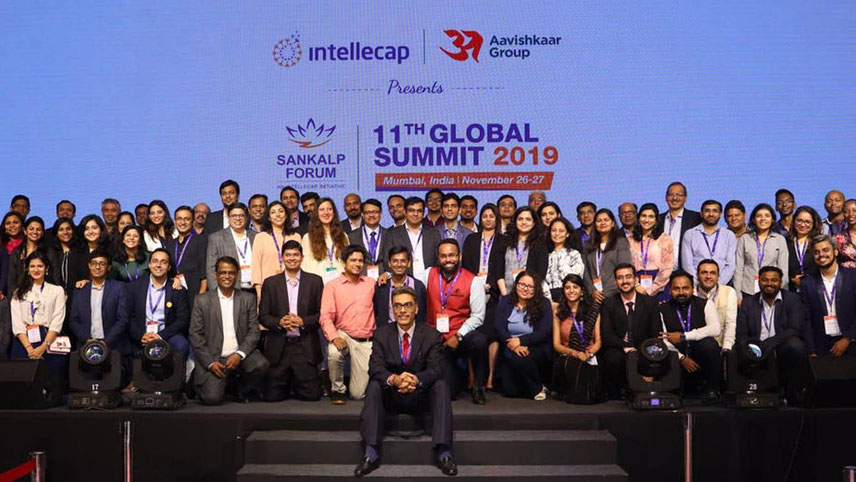
Intellecap is a pioneer in building enabling ecosystems
“With a strong distribution network and innovative technology, we are looking forward to a future of being known as the Phygital NBFC. Our products are uniquely designed to serve the financial requirements of the MSMEs in the Indian landscape. We nurture growing businesses with finances at the right time in order to unlock their growth potential,” states Sinha.
Creating a sustainable society
Intellecap, on the other hand, is a pioneer in building enabling ecosystems and channelling capital to create and nurture a sustainable and equitable society. Founded in 2002, it works across critical sectors like agriculture, livelihoods, climate change, clean energy, financial services, gender inclusion, healthcare, water and sanitation. Intellecap, through its presence in India and Africa, provides a broad range of consulting, research and investment banking services to multilateral agencies, development finance institutions, social enterprises, corporations, investors, policymakers and donors.
Intellecap recently created a platform called Circular Apparel Innovation Factory (CAIF) to identify enterprises which are working in the textile space on environmentally and socially relevant issues like better and non-chemical dyes, single use and bio-degradable plastics, etc. “We would like to increase our business and team size by five times over the next 10 years.
With every challenge there is an opportunity. Immense opportunity has opened up due to this Covid-19 challenge. Every business will be forced through this pandemic to see how it can take care of nature – clean land, clean air and clean water,” believes Bali.
With all these capabilities and competencies, the Aavishkaar group is all geared up to achieve its goals going forward and maintain its leadership position in the global impact investing space. It has been able to put forth a strong and robust platform which provides an array of services and solutions to the impact investing sector, the existence of which has become more relevant in the current context. Its pioneering efforts, across equity-led impact investing, for high risk, high impact businesses as also taking an entrepreneurship-based approach towards development, have now been well documented and have become a model for others to replicate.
Most importantly, Aavishkaar’s vision of creating impact without compromising on commercial aspects, is something that has certainly added flavour to the entire ecosystem, which in the past, struggled to exhibit the desired results. This particular shift is now also attracting a good deal of attention from traditional PE players. This will generate a good deal of resources for the impact sector and provide much-needed momentum and eventually the three billion underserved global population will get a better deal. And there is little doubt that here, the Aavishkaar group will be a key player.
